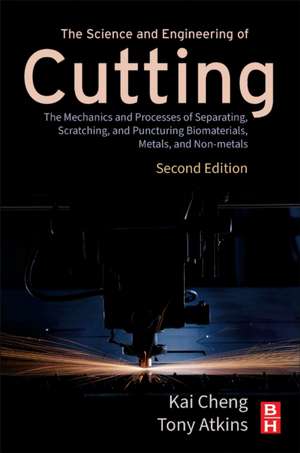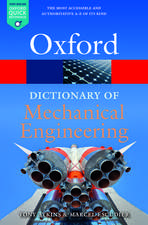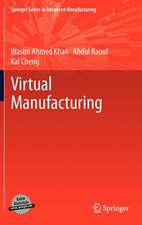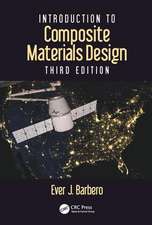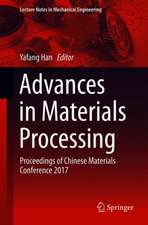The Science and Engineering of Cutting: The Mechanics and Processes of Separating, Scratching and Puncturing Biomaterials, Metals and Non-metals
Autor Kai Cheng, Tony Atkinsen Limba Engleză Paperback – 9 dec 2024
- Covers the processes and techniques of cutting in metals and non-metals
- Features new applications and case studies
- Looks afresh at nanomachining, finite element simulations, blunt tooling, and more
- Includes updated insight on the role of toughness in wear of solids, special measures required when cutting soft solids owing to their floppiness, the use of cutting to determine fracture toughness of very ductile polymers, and much more
Preț: 829.51 lei
Preț vechi: 911.55 lei
-9% Nou
Puncte Express: 1244
Preț estimativ în valută:
158.74€ • 166.91$ • 131.15£
158.74€ • 166.91$ • 131.15£
Carte disponibilă
Livrare economică 20 martie-03 aprilie
Preluare comenzi: 021 569.72.76
Specificații
ISBN-13: 9780323994224
ISBN-10: 0323994229
Pagini: 550
Dimensiuni: 152 x 229 mm
Ediția:2
Editura: ELSEVIER SCIENCE
ISBN-10: 0323994229
Pagini: 550
Dimensiuni: 152 x 229 mm
Ediția:2
Editura: ELSEVIER SCIENCE
Public țintă
Professionals and students in mechanical and materials engineering, manufacturing, and process and food engineers;secondary audiences in biomedical, civil, and other technology fields;
Cuprins
1. Controlled and Uncontrolled Separation of Parts: Cutting, Scraping, and Spreading
2. Fracture Mechanics and Friction
3. Simple Orthogonal Cutting of Floppy, Brittle, and Ductile Materials
4. Types of Chip: Load Fluctuations, Scaling, and Deformation Transitions
5. Slice-Push Ratio: Oblique Cutting and Curved Blades, Scissors, Guillotining, and Drilling
6. Cutting with More than One Edge: Scratching, Grinding, Abrasive Wear, Engraving, and Sculpting
7. Sawing, Chisels, and Files
8. Punching Holes
9. Sharpness and Bluntness
10. Unrestrained and Restrained Workpieces: Dynamic Cutting
11. Cutting in Biology, Paleontology, and Medicine
12. Food and Food-Cutting Devices and Wire Cutting
13. Teeth as Cutting Tools
14. Burrowing in Soils, Digging, and Ploughing
15. Unintentional and Accidental Cutting
16. Cutting with High Precision
17. Cutting of Components with Complex Geometries and Freeform Surfaces
18. The Science and Engineering of Cutting: Holistic Approaches and Future Perspectives
2. Fracture Mechanics and Friction
3. Simple Orthogonal Cutting of Floppy, Brittle, and Ductile Materials
4. Types of Chip: Load Fluctuations, Scaling, and Deformation Transitions
5. Slice-Push Ratio: Oblique Cutting and Curved Blades, Scissors, Guillotining, and Drilling
6. Cutting with More than One Edge: Scratching, Grinding, Abrasive Wear, Engraving, and Sculpting
7. Sawing, Chisels, and Files
8. Punching Holes
9. Sharpness and Bluntness
10. Unrestrained and Restrained Workpieces: Dynamic Cutting
11. Cutting in Biology, Paleontology, and Medicine
12. Food and Food-Cutting Devices and Wire Cutting
13. Teeth as Cutting Tools
14. Burrowing in Soils, Digging, and Ploughing
15. Unintentional and Accidental Cutting
16. Cutting with High Precision
17. Cutting of Components with Complex Geometries and Freeform Surfaces
18. The Science and Engineering of Cutting: Holistic Approaches and Future Perspectives
